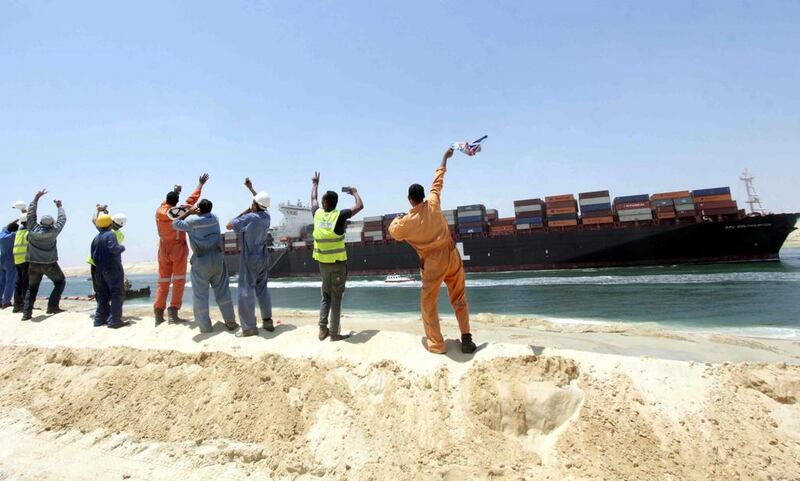They said it couldn’t be done so quickly and yet the massive enlargement of the Suez Canal – involving the dredging of a new 35km channel and the 37km expansion of an existing one – was completed in keeping with Abdel Fattah El Sisi’s desired deadline of a single year. On a recent tour of the now two-lane canal, which will be inaugurated on Thursday, Peter Hinchliffe, secretary general of the International Chamber of Shipping, described the achievement as “frankly astonishing”.
Mr El Sisi is anxious to prove his government’s ability to fulfil its promise to revive Egypt’s economy. With faster transit times and greater capacity, the canal will be able to handle 97 ships per day (formerly 49) and potentially increase annual income from $5.3 billion (Dh19.4bn) to $13.2 billion in 2023. Some call these projections unrealistic, since the canal’s revenue ultimately relies on other variables, including the vagaries of the global trade market and competitive shipping tolls.
But Egyptians are optimistic. Asked their opinion of the project, the most common response from a sampling of tradespeople, office workers and others in Cairo was “100 per cent!” (miyya-miyya) the local equivalent of two thumbs up.
The prevailing enthusiasm is due to the fact that, unlike other state-initiated developments, average citizens were directly involved in the canal’s enlargement, financing it through the purchase of tax-free bank certificates that raised $8 billion in just eight days. The project’s progress has been closely followed by local and international media and is perceived, in Egypt at least, as a virtually indisputable success.
The canal expansion is the first phase of a megaproject involving upgraded shipping facilities and other industrial and residential developments that could favourably transform the cities of Suez, Port Said and Ismailia, generating much-needed jobs.
“Step-by-step” said a state-owned insurance company manager, affirming the widely-held belief that the plans surrounding the canal represent a wise long-term investment. A young employee of a real estate holding company felt the canal’s short-term success was also a sure thing:‘‘Let’s just hope the money goes where it is most needed.”
But the signs of Egypt’s economic malaise are everywhere, from the empty hotels to the bustling pavement cafes where unemployed men while away their time. Along with tourism, the canal is one of Egypt’s biggest foreign currency earners.
Perhaps more importantly, it has helped define Egypt’s self-image as a modern nation at the heart of world trade since its 1869 inauguration.
Gamal Abdel Nasser’s 1956 nationalisation of the canal – and his diplomatic victory over Israel, Britain and France following their attempt to seize it – made Suez a powerful symbol, not only of Egypt’s self-determination but for liberation movements in Cuba and throughout Africa.
Mr El Sisi has called the new Suez Canal “Egypt’s gift to the world” and thousands of guests, including Vladimir Putin and François Hollande, will attend the opening ceremony.
The event will do well to beat the original inauguration hosted by Ismail Pasha who, like Egypt’s current leader, invited the heads of almost every nation, hoping to impress them with Egypt’s progress.
To coincide with the canal opening, Ismail completed construction of an elegant new quarter in Cairo, in addition to roads and bridges to facilitate the movement of his 1,000 guests, who enjoyed a week-long series of epic parties. France’s Empress Eugenie had 60 gowns made for her visit.
On the eve of the inauguration, 160 vessels festooned in banners filled the harbour at Port Said. Ismail aimed to win international support for the country’s independence from the Ottoman Empire. Needless to say, the Sultan was not on the guest list. Coincidentally, Turkey’s president, Recep Tayyip Erdogan, has not been invited to this year’s inauguration, either.
Thursday’s festivities will include an air show featuring Rafale combat jets and a performance of Verdi’s Aida. Mr El Sisi will observe the ceremony from the first yacht to cruise the canal in 1869. Most Egyptians will enjoy the spectacle on TV, and the state is expected to announce Thursday as a national holiday, not least to reduce Cairo’s congestion and facilitate tighter security.
The chairman of the Suez Canal Authority, Mohab Mamish, claims that “the new canal is a symbol of the new Egypt”. This may be an overstatement, but whether or not it provides the anticipated economic benefits, the canal has already inspired public confidence. And that’s a priceless commodity.
Maria Golia is an author and writer based in Cairo





